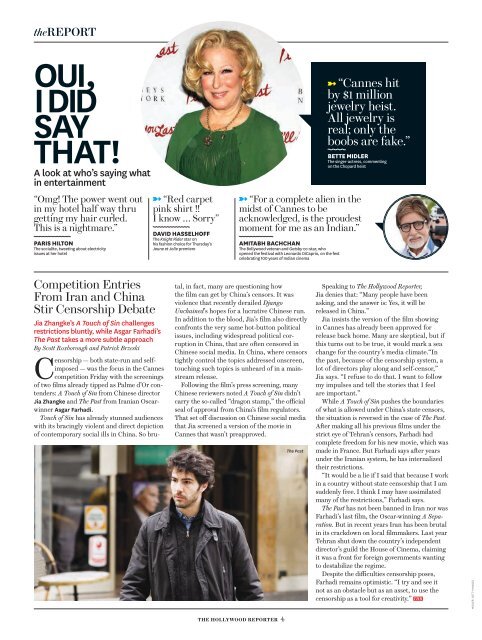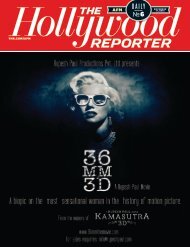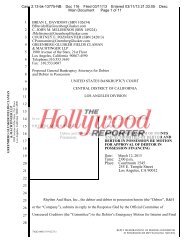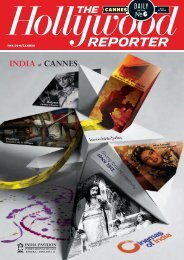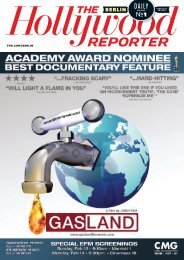You also want an ePaper? Increase the reach of your titles
YUMPU automatically turns print PDFs into web optimized ePapers that Google loves.
theREPORT<br />
OUI,<br />
I DID<br />
SAY<br />
THAT!<br />
A look at who’s saying what<br />
in entertainment<br />
“Omg! <strong>The</strong> power went out<br />
in my hotel half way thru<br />
getting my hair curled.<br />
This is a nightmare.”<br />
PARIS HILTON<br />
<strong>The</strong> socialite, tweeting about electricity<br />
issues at her hotel<br />
“Red carpet<br />
pink shirt !!<br />
I know … Sorry”<br />
DAVID HASSELHOFF<br />
<strong>The</strong> Knight Rider star on<br />
his fashion choice for Thursday’s<br />
Jeune et Jolie premiere<br />
“For a complete alien in the<br />
midst of Cannes to be<br />
acknowledged, is the proudest<br />
moment for me as an Indian.”<br />
AMITABH BACHCHAN<br />
<strong>The</strong> Bollywood veteran and Gatsby co-star, who<br />
opened the festival with Leonardo DiCaprio, on the fest<br />
celebrating 100 years of Indian cinema<br />
“Cannes hit<br />
by $1 million<br />
jewelry heist.<br />
All jewelry is<br />
real; only the<br />
boobs are fake.”<br />
BETTE MIDLER<br />
<strong>The</strong> singer-actress, commenting<br />
on the Chopard heist<br />
Competition Entries<br />
From Iran and China<br />
Stir Censorship Debate<br />
Jia Zhangke’s A Touch of Sin challenges<br />
restrictions bluntly, while Asgar Farhadi’s<br />
<strong>The</strong> Past takes a more subtle approach<br />
By Scott Roxborough and Patrick Brzeski<br />
Censorship — both state-run and selfimposed<br />
— was the focus in the Cannes<br />
competition Friday with the screenings<br />
of two films already tipped as Palme d’Or contenders:<br />
A Touch of Sin from Chinese director<br />
Jia Zhangke and <strong>The</strong> Past from Iranian Oscarwinner<br />
Asgar Farhadi.<br />
Touch of Sin has already stunned audiences<br />
with its bracingly violent and direct depiction<br />
of contemporary social ills in China. So bru-<br />
tal, in fact, many are questioning how<br />
the film can get by China’s censors. It was<br />
violence that recently derailed Django<br />
Unchained’s hopes for a lucrative Chinese run.<br />
In addition to the blood, Jia’s film also directly<br />
confronts the very same hot-button political<br />
issues, including widespread political corruption<br />
in China, that are often censored in<br />
Chinese social media. In China, where censors<br />
tightly control the topics addressed onscreen,<br />
touching such topics is unheard of in a mainstream<br />
release.<br />
Following the film’s press screening, many<br />
Chinese reviewers noted A Touch of Sin didn’t<br />
carry the so-called “dragon stamp,” the official<br />
seal of approval from China’s film regulators.<br />
That set off discussion on Chinese social media<br />
that Jia screened a version of the movie in<br />
Cannes that wasn’t preapproved.<br />
<strong>The</strong> Past<br />
Speaking to <strong>The</strong> <strong>Hollywood</strong> <strong>Reporter</strong>,<br />
Jia denies that: “Many people have been<br />
asking, and the answer is: Yes, it will be<br />
released in China.”<br />
Jia insists the version of the film showing<br />
in Cannes has already been approved for<br />
release back home. Many are skeptical, but if<br />
this turns out to be true, it would mark a sea<br />
change for the country’s media climate.“In<br />
the past, because of the censorship system, a<br />
lot of directors play along and self-censor,”<br />
Jia says. “I refuse to do that. I want to follow<br />
my impulses and tell the stories that I feel<br />
are important.”<br />
While A Touch of Sin pushes the boundaries<br />
of what is allowed under China’s state censors,<br />
the situation is reversed in the case of <strong>The</strong> Past.<br />
After making all his previous films under the<br />
strict eye of Tehran’s censors, Farhadi had<br />
complete freedom for his new movie, which was<br />
made in France. But Farhadi says after years<br />
under the Iranian system, he has internalized<br />
their restrictions.<br />
“It would be a lie if I said that because I work<br />
in a country without state censorship that I am<br />
suddenly free. I think I may have assimilated<br />
many of the restrictions,” Farhadi says.<br />
<strong>The</strong> Past has not been banned in Iran nor was<br />
Farhadi’s last film, the Oscar-winning A Separation.<br />
But in recent years Iran has been brutal<br />
in its crackdown on local filmmakers. Last year<br />
Tehran shut down the country’s independent<br />
director’s guild the House of Cinema, claiming<br />
it was a front for foreign governments wanting<br />
to destabilize the regime.<br />
Despite the difficulties censorship poses,<br />
Farhadi remains optimistic. “I try and see it<br />
not as an obstacle but as an asset, to use the<br />
censorship as a tool for creativity.”<br />
MIDLER: GETTY IMAGES<br />
THE HOLLYWOOD REPORTER 4


